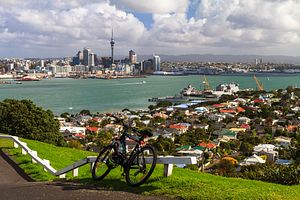New Zealand’s economic outlook has been rosy of late: booming agricultural exports, a Reserve Bank outlook of 3 percent growth for 2015, and a dollar that at one point last month was approaching parity with the Aussie, which would have been a first since the currencies were floated in the mid 1980s.
However parity with the Aussies is not always something to aspire to: House prices in Auckland are increasing steeply and out of step with the rest of the country, with the average price now at NZ800,000-plus (around $600,000), still below Sydney’s A$1 million ($795,000), but getting closer, faster.
A new commentary from David Roberton, the head of equities at Macquarie Securities (NZ), suggests Auckland’s rapid housing bubble may be headed for a bust similar to Toronto’s mid-1980s crash, when downtown real estate prices dropped by as much as 50 percent between 1989 and 1996. The Diplomat has not seen the commentary, which the New Zealand Herald says was distributed among finance experts. The newspaper did quote Shamubeel Eaqub, New Zealand Institute of Economic Research principal economist. “The Auckland housing market is a speculative bubble… and we have no idea what will be the catalyst for a change,” he said. It will most likely be something external, even a “hard landing in China or Australia.”
Toronto’s housing market has bounced back, though the IMF recently noted that the country has one of the highest rates of household debt in the OECD. House prices in Toronto have risen 60 percent since 2000 and the average Toronto home costs CAD1 million ($830,000). In the case of Toronto before its 1990s bust and Auckland now one thing seems clear: Everyone was caught up in the boom, something Eaqub likened to a Ponzi scheme in Auckland now. Scarcity drove up prices and those rushing to cash in on it drove them up farther.
Nationwide there has been an 8 percent rise in house prices from March 2014 to March 2015. The current median price is NZ$475,000. Not only has Auckland increased by 13 percent but the March median was NZ$720,000, according to the Real Estate Institute of New Zealand. Another report for April suggests the price for residential properties was NZ$776,729.
Half of all sales were auctions, according to the REINZ. “While the increase in the number of sales is more or less spread across the country, the movement in the national median price is almost entirely an Auckland effect,” reads a statement on the REINZ website by Chief Executive Colleen Milne. Yet the more staggering number might be this: In April Auckland house prices rose by NZ$918 per day, according to sales data from Barfoot and Thompson, and for the first time the average price in Auckland has topped NZ$800,000.
New Zealand’s economy has been doing well, with low unemployment (considered a factor in Roberton’s assessment of Toronto’s rising house prices and eventual bust) and growth of 3.3 percent in 2014, along with growing demand for its food from China even as Australia’s commodities boom loses steam. New Zealand’s low interest rates and low mortgage rates are considered important factors in the housing price surge. It is worry enough that the Reserve Bank listed it as a possible risk or uncertainty in February, noting that, “high rates of house price inflation can spill over into stronger spending and pressure on consumer price inflation. And the more that house prices get out of line with historic relativities, the greater the risk of a sharp correction, leading to financial instability.” Kiwis apparently have 73 percent of their assets, on average, tied up in real estate. The RBNZ also noted recent IMF data: New Zealand (and Norway) has the highest deviation between income ratios and house prices against historic trends, compared with other Western European and Anglophone nations.
Meanwhile, the RBNZ suggests that Auckland will need to construct 10,000 more houses each year for the next 30 years to meet projected demand; the shortage is currently close to 20,000 homes.
Helen Clark was based in Hanoi for six years as a reporter and magazine editor. She has written for two dozen publications including The Diplomat (as Bridget O’Flaherty), Time, The Economist, the Asia Times Online and the Australian Associated Press.

































